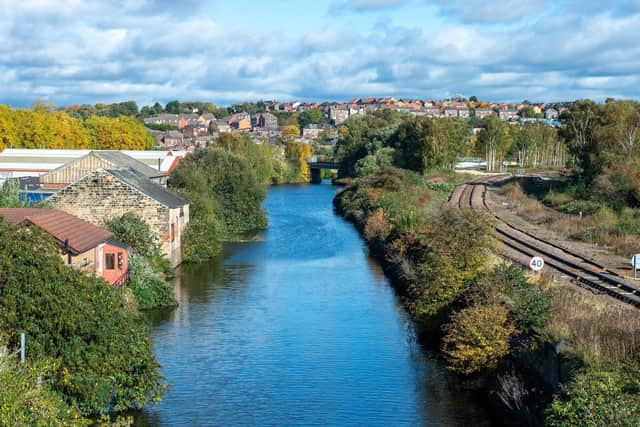Mexborough, the town that supplied china and pottery to royalty and the birthplace of Brian Blessed and Vegan Society founder


Ask the question “What made Mexborough?” and you’ll very likely get a three-word reply. Mining, quarrying, brick-making. But people frequently forget that this small town was once the supplier of superior decorated china and pottery to royalty, and that today, many of those products are on display in museums around the world. When they come up at auction, they are snapped up by collectors for considerable sums.
True, the story of Rockingham table and decorative ware started a little further down the road, at Swinton, but it was an astute Mexborough family who sprang into action when they saw the brand and distinctive mark getting into trouble. They bought up the Rockingham rights to designs and decorations, and eventually moved the business onto their own patch.
Advertisement
Hide AdAdvertisement
Hide AdThe head of the clan was Isaac Baguley, a man who had started off as a humble painter, but who rose through the ranks to management status. He revitalised the operation, brought in biscuit ware from other manufacturers and had it glazed, gilded and enamelled. It was his son, Alfred who moved from the old site to the new one, and he went on working until his death in 1891. Today, experts say that the Baguley pieces stand out in their own right.


Mexborough, although it is technically part of Doncaster Metropolitan Borough, has been a fiercely independent place to live and work for all its long existence. The community here had its natural defences strengthened by two rivers – the Don and the Dearne – and archaeologists have long been fascinated by the earthworks known locally as The Roman Ridge.
Some argue that it was built as a massive defence barrier to stop the northern advance of the Romans, while others believe it was constructed after they left, and when England was dividing itself into a jigsaw of small kingdoms.
By the end of the Saxon period, two warlords held sway in these parts, but Ulfkil and Wulfheah had to bow their heads after the Norman Conquest, and the man that they bowed to was a powerful Baron, Roger de Busil. Roger was greedy and by the time he shuffled off to meet his maker in 1099, he was on record as owning 46 manors in Yorkshire alone.
Advertisement
Hide AdAdvertisement
Hide AdIf there was unrest from the locals, he had four castles in which to defend himself – Mexborough, nearby Tickhill, Kimberworth and Laughton-en-le-Morthen, close to Rotherham. You clearly didn’t mess with our Roger.
In later centuries it was industry that made Mexborough prosper. That – as in many other towns – brought problems of its own. There may have been employment, but there was also pollution. However, the people here thought laterally and a much-praised multi-bed hospital replaced the old cottage unit in 1905. It was built on land donated by local bigwig Lord Montagu, and his name is perpetuated through today’s modern facilities, which are part of the Doncaster and Bassetlaw NHS Trust.
It’s in Mexborough that we find one of the North’s first Co-operative collaborations, founded by nine of the town’s working men in 1861. By the time it was taken over by the Barnsley Co-op, just after the death of Queen Victoria, it had 10 shops, and well over 1,000 members. One of the Co-op’s huge flour mills sits adjacent to the Don Navigation.
It’s a town that has produced some remarkable and contrasting people. There’s Donald Watson, for example, who founded The Vegan Society in 1944, and who proved his point about a different way of eating by living to the ripe old age of 94.
Advertisement
Hide AdAdvertisement
Hide AdIn contrast, there are two of Britain’s best poets – the much-missed former Poet Laureate Ted Hughes and Ian Parks, once described as “the finest love poet of his generation”. Arguably the town’s most famous son is the indefatigable Brian Blessed, who recently turned 84. He was born in Montagu Hospital and grew up in nearby Goldthorpe. He was brought up by his dad William – a fervent socialist and a miner at Hickleton Main pit – and his mum, Hilda.
He still has vivid memories of his father coming home from shifts, and using a tin bath in front of the fire to get washed and clean. “No indoor bathrooms back then,” he recalls. “And the bath itself hung on a nail in the outdoors backyard. I was allowed to soap his back and his skin was pitted all over with blue scars, where he’d been hit by flying pieces of coal.
"The lads used to work half-naked in those days, it was so hot below ground. I also remember that, during the war, we took in a pair of Polish airmen as lodgers, who flew out of what was Finningley RAF base. They were lovely, very brave lads.”
Blessed was himself to serve in the RAF Regiment, doing his National Service, and then went on to go to drama school in London, “rather to my dad’s surprise, but to his great pride – because I broke that line of being reliant on the pit.”
Advertisement
Hide AdAdvertisement
Hide AdHe has enjoyed a remarkable career but has never lost his affinity with where he came from. “I’m inordinately proud to have those South Yorkshire roots,” he says, “They mean a lot”.
He thinks his acting talents come from his father who was an active member of the local amateur dramatic and operatic societies. “He was passionate about Shakespeare, and knew every word of Hamlet and Julius Caesar. People think that miners just mined,” says Brian, “but in fact there was, and still is, an amazing creative and social life to these communities”.
And there’s another well known acting name associated with Mexborough – Kenneth Haigh, who starred in the first professional stage production of the ultimate in Kitchen Sink dramas, Look back in Anger. Amateur performances are one thing, but the love of drama was never strong enough to sustain a professional theatre in the town.
If ever there was an unlucky venue, though, it was The Prince of Wales. It opened in 1893 and its owners later decided that it needed a re-vamp and a change of name in 1912, and it became The Hippodrome.
Advertisement
Hide AdAdvertisement
Hide AdIt closed in 1931, reopened in 1934, closed again the following year, and then revived itself yet again in 1936 as The New Hippodrome. That venture lasted for only a year, and then it was sold and offered for demolition.
However the site wasn’t fully cleared until the early 50s. But two very famous entertainers took their bows in the spotlight here – Stan Laurel and Gracie Fields – long before both became international stars.
The theatre may have disappeared nearly 70 years back, but the Montagu Arms, the stars’ lodging house, is still with us, a thriving and popular community pub. And “community” is what Mexborough, in essence, is all about.
Support The Yorkshire Post and become a subscriber today. Your subscription will help us to continue to bring quality news to the people of Yorkshire. In return, you'll see fewer ads on site, get free access to our app and receive exclusive members-only offers. Click here to subscribe.